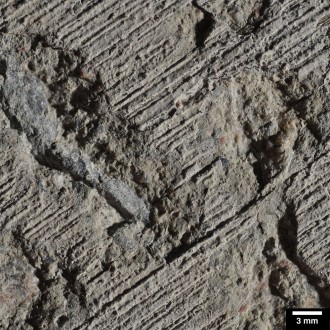Scaling
Scaling is a form of freeze-thaw damage (FTD) that involves the progressive loss of material from the exposed surface. It is probably the most common form of distress in freeze-thaw environments (see the discussion on salt weathering for the type of scaling that occurs in desert environs). In many cases distress from scaling is limited to the loss of a thin veneer of surface mortar and may have only an aesthetic affect on an element.
Many factors make concrete susceptible to scaling, ranging from improper proportioning (inadequate air and/or excessive water content) and poor materials (unsound aggregates), to poor finishing and curing practices, to improper design and project specifications. Poor maintenance practices, such as using excessive dosages of deicing and anti-icing chemicals and “stockpiling” snow laden with these chemicals on pavements can cause considerable scaling and freeze-thaw damage. DRP has the experience needed to recognize and document the various factors that caused scaling and freeze thaw damage and help stakeholders develop appropriate measures to remediate the damage.

Mortar flaking is a commonly observed scaling mechanism in arid climates such as the mountain states of the western US.

Photograph of airfield pavement core where scaling occurred in large sheets.

In scaled concrete microcracks (red arrows) are typically restricted to the very top of a pavement, with sound concrete commonly observed beneath.

Photograph showing scaling that occurred where snow was stockpiled on the edge of a sidewalk.

Reflected light photomicrograph of the polished surface of a core where poor curing led to scaling.

Reflected light photomicrograph of sub-horizontal crack (red arrows) where scaling was associated with poor finishing practices.
Questions? We have answers. Contact us.
Give us a call at 303.938.0166 to get your project rolling.
